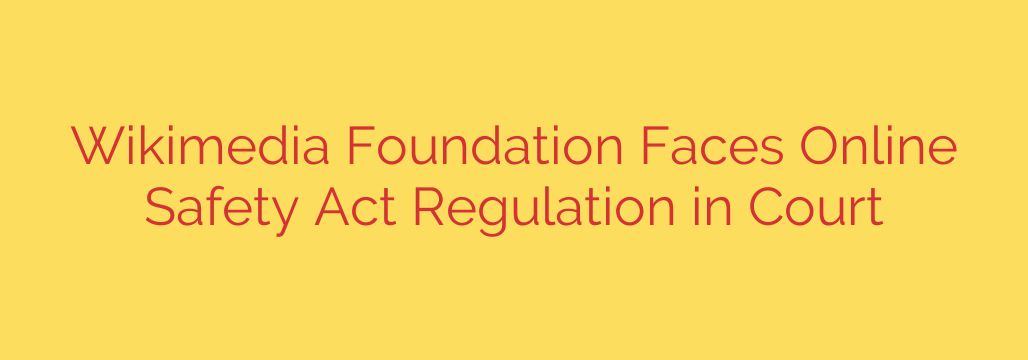
The UK’s Online Safety Act: Why Wikipedia is Taking the Government to Court
A landmark legal battle is unfolding in the United Kingdom, with the very principles of a free and open internet hanging in the balance. The Wikimedia Foundation, the non-profit organization behind Wikipedia, has launched a legal challenge against the UK’s wide-reaching Online Safety Act. This move highlights a fundamental conflict between the government’s approach to online regulation and the community-led model that has made Wikipedia a cornerstone of global knowledge.
At the heart of the dispute are concerns that the new law could force fundamental changes to how platforms like Wikipedia operate, potentially leading to censorship and undermining the privacy of users worldwide.
Understanding the Core Conflict
The Online Safety Act grants Ofcom, the UK’s communications regulator, sweeping new powers to regulate online platforms. The stated goal is to protect users, especially children, from illegal and harmful content. However, the Wikimedia Foundation argues that the law’s vague definitions and extensive requirements pose a significant threat to its model of free, open knowledge.
Wikipedia is not a typical social media company. It is built and maintained by a global community of volunteer editors. The platform’s strength lies in its decentralized, human-led process of content creation and moderation. The foundation’s legal challenge centers on several key arguments:
Risk of Proactive Monitoring and Censorship: The Act could compel platforms to proactively monitor and filter all user-generated content to identify and remove material deemed “harmful.” For Wikipedia, this could mean that valuable educational articles on sensitive topics—such as health, history, or sexuality—are flagged and removed out of an abundance of caution. This creates a chilling effect on free speech and could lead to the removal of legitimate, encyclopedic information.
Incompatibility with the Volunteer Model: Imposing stringent, top-down content moderation rules is fundamentally at odds with Wikipedia’s volunteer-based system. The global community of editors operates on principles of consensus and established editorial policies. Forcing this community to comply with broad governmental mandates could dismantle the very structure that allows Wikipedia to thrive.
Threats to User Privacy: Perhaps most alarmingly, the law includes provisions that could be used to undermine encryption and force platforms to scan private user communications. While Wikipedia is a public-facing site, this sets a dangerous precedent for the internet at large. The foundation argues that such measures would amount to mass surveillance of online activity, eroding the trust and privacy essential for a free internet.
What’s at Stake for the Future of the Internet?
This legal challenge is about more than just Wikipedia. It represents a critical test case for the future of online regulation globally. The outcome could set a powerful precedent for how other countries approach internet governance.
If the UK government’s position prevails, it could usher in an era where platforms are required to act as state-enforced censors. This would not only affect major user-generated content sites but could also impact smaller forums, open-source projects, and any online space that relies on community collaboration.
The core principle being defended is that a free and democratic society depends on the ability to access and share information without undue government interference. The fear is that well-intentioned but poorly designed laws will inadvertently sacrifice freedom of expression in the name of safety.
Key Takeaways and Security Tips for Users
As this case proceeds, it serves as a vital reminder of the ongoing debates shaping our digital world. Here’s what you should know:
- Understand Content Regulation: Pay attention to laws like the Online Safety Act. While designed to protect users, their broad language can have unintended consequences for free speech and privacy.
- Value Volunteer-Led Platforms: Recognize the unique value of community-driven projects like Wikipedia. Their model is distinct from for-profit tech companies and is particularly vulnerable to one-size-fits-all regulation.
- Defend Digital Rights: This case underscores the importance of a free, open, and secure internet. Supporting organizations that advocate for digital rights and freedom of expression helps ensure these principles are defended in courts and legislatures around the world.
Ultimately, the Wikimedia Foundation’s legal challenge is a defense of its mission: to ensure everyone can freely share in the sum of all human knowledge. The court’s decision will have lasting implications not just for the future of Wikipedia in the UK, but for the internet as we know it.
Source: https://go.theregister.com/feed/www.theregister.com/2025/08/11/wikimedia_foundation_loses_online_safety/








